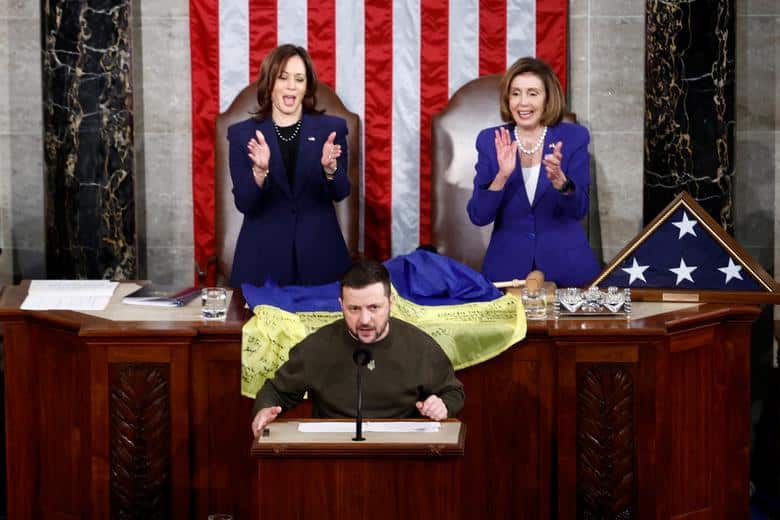US lawmakers were expected to approve a $45 billion aid package for Ukraine on Friday, as President Volodymyr Zelenskiy returned from Washington with the promise of Patriot missiles to help fend off Russia’s invasion.
The military and economic assistance, part of a huge government spending bill, follows US aid worth around $50 billion sent to Ukraine this year as well sanctions imposed on Russia by the West that now include a cap on Russian oil prices.
Russia responded to the cap on Friday by threatening to cut oil output by 5 -7 per cent early next year through halting sales to countries that support the measure.
Zelenskiy has long sought Patriot surface-to-air missiles to help counter Russian air strikes, which have razed cities, towns and villages during 10 months of conflict and knocked out power and water supply across the country over the past three months.
Zelenskiy said in his Telegram channel: “We are coming back from Washington with …something that will really help.”
US officials say, however, that the single Patriot battery that President Joe Biden told Zelenskiy would be supplied to Ukraine would not change the course of the war.
Washington and its allies have been unwilling to supply Kyiv with modern battle tanks and long-range missiles called ATACMS that could reach far behind frontlines and into Russia itself.
On Friday, debate shifted to the floor of the Democratic-led House of Representatives, discussing the giant $1.66 trillion spending bill that includes the Ukraine funds, already approved by the senate the previous day.
Kyiv and the Biden administration are wary that retaining US Congressional support for aid could become more complicated when Republicans take a slim majority in the House in the new year: a few rightwing Republicans oppose aid and other lawmakers have called for tighter oversight.
Russian President Vladimir Putin made a visit on Friday to the city of Tula, known for arms manufacturing, where he was shown telling defence industry chiefs to boost output of weapons for the front.
In Bakhmut, an eastern Ukrainian city that has become the target of Russian attempts to advance in recent weeks in fighting that has killed thousands of soldiers, Valerii Deriukha, 55, was one of the few residents who have not fled.
He was chopping twigs for firewood with a small axe, while metallic explosions of artillery rang out in the air.
“You see with your own eyes what life is like here. What life? It is war,” he said. Two storeys had been blasted off a building nearby. “How is life? You see for yourself.”
REPORTED REINFORCEMENTS
Ukraine has driven Russian forces from the areas around its capital Kyiv and second biggest city Kharkiv. Moscow is now focused on holding on to areas its forces occupy in southern and eastern Ukraine – around a fifth of the country.
Ukrainian forces repelled attacks on at least 17 settlements in eastern Ukraine, its general staff said early on Friday.
It added that Kremlin forces had launched 12 missile and air strikes, including on civilian targets, away from the front lines in eastern and southeastern Ukraine.
The exiled mayor of Russian-occupied Melitopol in the south said more Russian troops had been brought into the city and were strengthening fortifications, with residents now only able to leave on foot.
A car bomb went off in the city earlier in the day, Ivan Fedorov added in his online media briefing.
Russian forces shelled the southern Kherson region 61 times in 24 hours, half of those within Kherson city, killing one person, Governor Yaroslav Yanushevych said. Russia withdrew from that city last month.
In the neighbouring Zaporizhzhia region, a governor installed by Russia, Yevgeny Balitsky, said shelling of the nuclear power plant there had “almost stopped” but Russian troops would not leave.
Ukraine and Russia have accused each other of risking nuclear disaster in fighting near the plant, Europe’s largest, and the United Nations has called for a safe zone there.
The International Atomic Energy Agency (IAEA), which has called for a safe zone around the plant to reduce the risk of nuclear disaster, said talks with the two sides were making progress on the issue.
Reuters was not able to confirm the battlefield reports.







Click here to change your cookie preferences